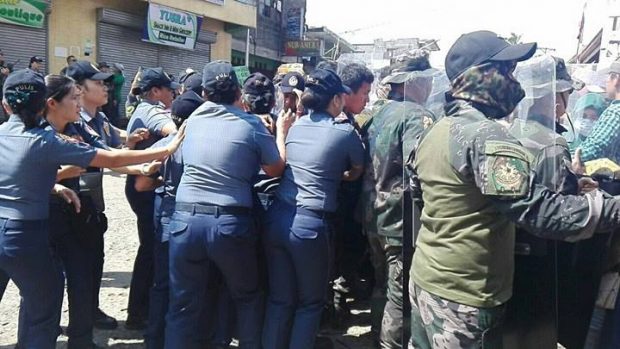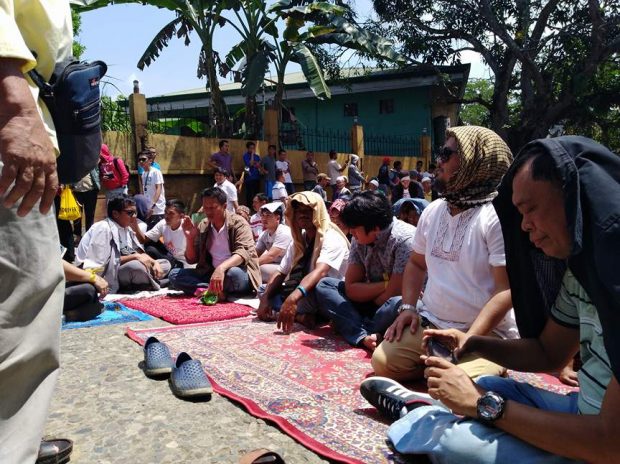‘Actors can enter Marawi, why can’t we?’ residents ask Army, Police
About a thousand displaced residents of Marawi City were prevented from visiting the so-called ground zero Friday by combined elements of the city police and 3rd Infantry Division of the Philippine Army.
Wanting to hold a M’balingan (Meranaw for “coming home”) and Jumaat (Friday Congretional Prayer), the residents wanted to march from the city center to the most devastated parts of Marawi but were blocked by security forces at the foot of Pumping Bridge at about nine o’clock in the morning.
“We just want to visit the destroyed homes and hold a prayer event. Why are they still preventing us?” Tindeg Ranao national coordinator Aida Ibrahim told Kodao.

Police and army personnel blocking displaced Marawi residents who want to hold a prayer event inside the city’s so-called ground zero. (Kilab Multimedia photo)
The military has identified at least 24 Marawi City barangays as off limits to residents and landowners due to so-called security issues.
Some of the baranggays are Marinaut, Padian, Pamping, Lilud Madaya, Raya Madaya, Kibulog, Banggolo, Proper Madaya, Tolali, Upper Tolali, Pangarongan, Norlaya Village, Baryo Paypay, Baryo Naga, Monkado Colony, Kadingilan, West Marinaut, Upper Marinaut, Timbangalan, Papandayan.
Ibrahim said they could not understand why movie actors such as Zanjoe Marudo and other celebrities have been allowed inside “ground zero” but Meranaws themselves are barred from visiting their communities months after the so-called liberation of Marawi.
Marudo played an army officer who participated in the siege of Marawi in a recent television special.
“It is high time for residents to see their homes, salvage what was left of their belongings and rebuild their houses. For 10 months, they were deprived of their right to come back to their homes and were angered at reports that President Rodrigo Duterte would convert their communities into a military camp, a tourism hub and commercial center instead of rebuilding their houses,” Tindeg Ranao’s statement said.
“The Meranaw landowners and residents want to go back to their communities which they considered as their ancestral homes, decades of ownership dates back before it was identified as military reservation area or secured by President Duterte for other purpose than landowners rebuilding their homes,” it added.
The group said landowners were angered at learning that some “ground zero” areas were targeted as military camps such as Brgy. Kapantaran and other areas as economic zones.
Tindeg Ranao said the displaced residents are united in protesting against an additional military camp inside Marawi, saying Camp Ranao already serves as the camp for the 103rd Infantry Brigade of the Philippine Army as well as an undisclosed number of US soldiers under the US-RP Balikatan Exercises.
Landowners are demanding that consultations are held before planning for the reconstruction of Marawi starts, it added.
They are also demanding for the indemnification of landowners whose houses were destroyed by “excessive” military airstrikes, Tindeg Ranao said.

Displaced Marawi residents forced to hold their Jumaat at the foot of Pumping Bridge. (KIlab Multimedia photo)
Humanitarian crisis
Tindeg Ranao said the five-month old siege in June to November last year has caused a humanitarian crisis among the people of Lanao del Sur.
Citing Department of Social Welfare and Development figures, the group said there are at least 7,551 evacuees that have yet gone back to Marawi City four months after its so-called liberation from ISIS-inspired gunmen.
But there are still an undetermined number of evacuees that are still in the evacuation centers or staying with their relatives, it said.
Tindeg Ranao said transitional houses built for these residents at the Sagonsongan area at the boundary of Marawi City and Saguiaran, Lanao del Sur have been abandoned due to lack of services such as water.
Journalist threatened
Meanwhile, a journalist covering the march was threatened by an unidentified Army officer at the Pumping Bridge barricade.
While taking photos of the displaced residents at the PNP-PA blockade at the city’s Rapitan Bridge, the unidentified officer saw Davao Today reporter Kath M. Cortez Cortez’s media ID and reportedly shouted: “’Uy, taga-Davao. Kumpiskahin ang ID! Kumpiskahin ang camera! Palabasin ‘yan ng Marawi!” (Hey, she’s from Davao! Confiscate her ID! Confiscate her camera! Get her out of Marawi!)
Before soldiers could carry out the order, Cortez had safely retreated to the back of rally where she has been joined by fellow journalists from Davao City.
But even when Cortez was at the back, soldiers kept ordering her to leave.
“Kaha-harass lang ulit sa akin. Pinapa-alis na talaga nila ako. But patapos na ang program,” Cortez told Kodao two hours after the first incident. (They harassed me again. They really want me out of here. But the rally is about to end anyway.) # (Raymund B. Villanueva)
